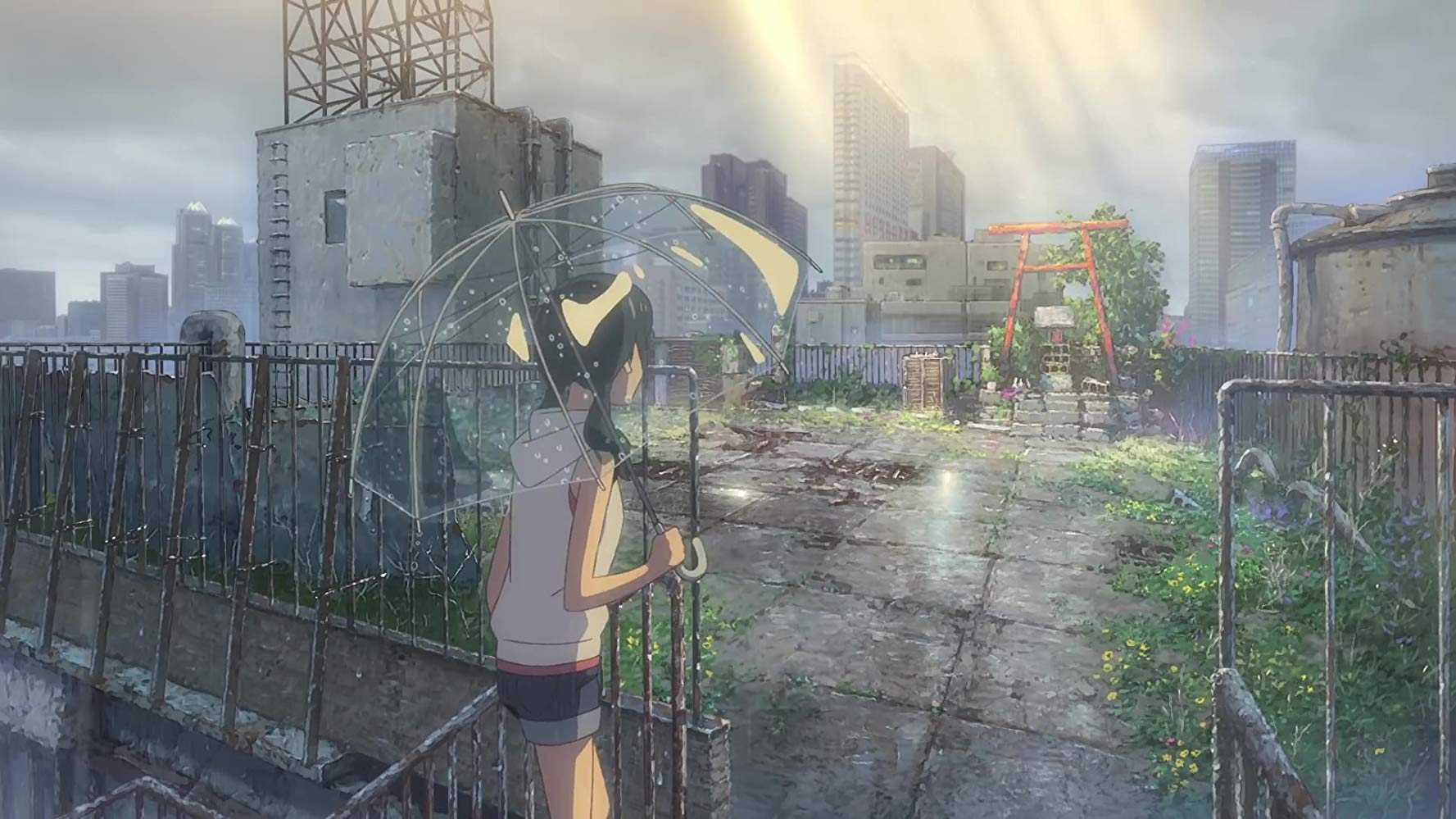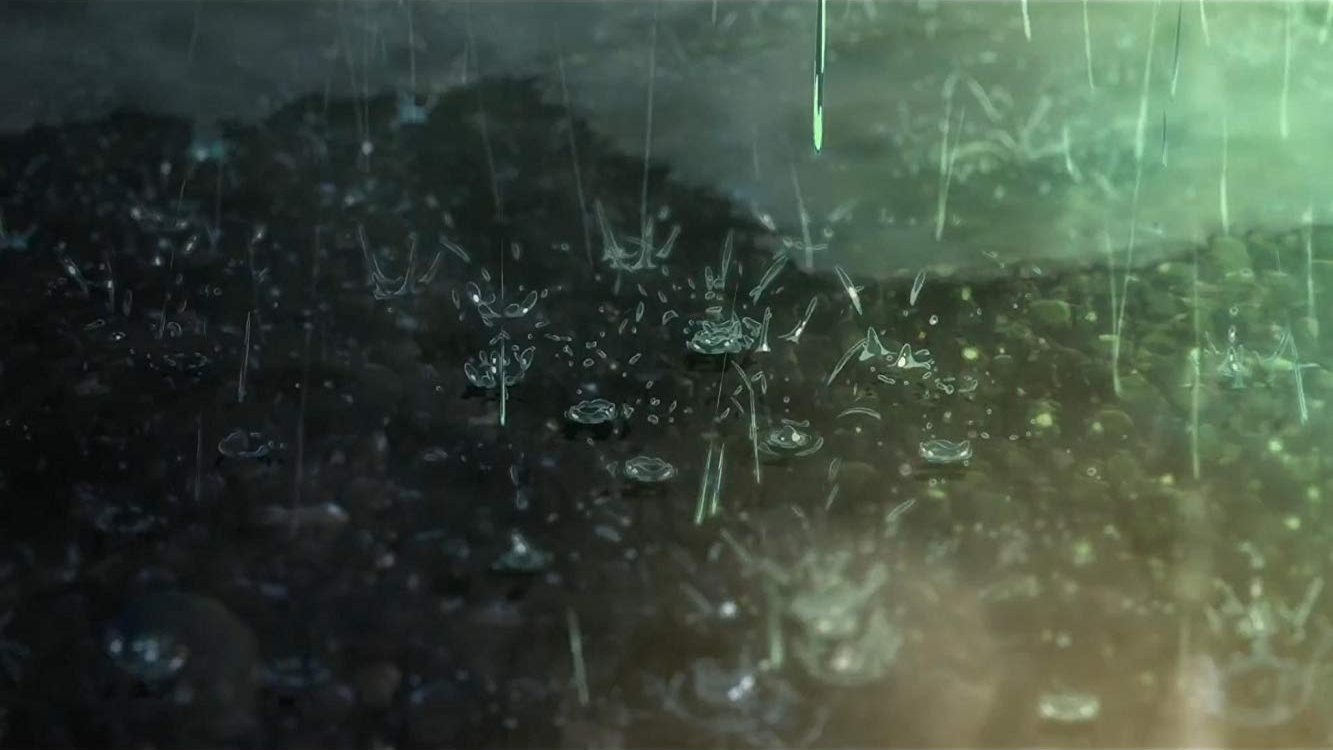I just watched “Tenki no Ko” (“Weathering with you”, a rather cheesy translation I might add), and within the post-Your Name hype and the Yandere jokes often used in the movie (Why are the girls saying the male protagonist is looking at their boobs so often?), the visuals and sounds really catapult you into the universe. The story is mainly about the boy meeting and dating a random stranger that turns out to be the legendary Sunshine Girl, but SO many things are explored in the movie and never finished - some reviewers actually complained about the lack of cohesiveness!
Needless to say, there will be spoilers. If you don’t want to know what happens ahead of time, you can page away now. Also, this blog isn’t going to update weekly! I only write posts when I have a lot to talk about, but movies always means a lot of conversation, so here we go.

My girlfriend is a God
If you haven’t followed me on Masto or Twitter, you might not realize that I science the shit out of every fictive universe I’m interested in. Tenki no Ko is no exception.
In the beginning of the movie, Hina finds a small spot of sunshine within constant rain in the Tokyo prefecture. She walks through it, gets teleported to the sky, and becomes fundamentally connected to it. She can pray for the clouds to part over an area for a while (hence “Sunshine Girl”), but doing so too much will - spoiler - slowly turn her to water, and eventually - major spoiler - she’ll be taken to the skies, and the regular sunny weather will return.
Of course, once you (Hina is a teen without a permanent job, I might add) find yourself with a useful power, you make a business out of it. Hodaka, the male protagonist, sets up a thriving business based on her sky-mage powers alone. Hina notices a central theme of happiness from her "customers" making her happy as well, a pretty core theme in Bhuddist enlightenment, but both Hodaka and Director Shinkai completely abandoned the topic in all following scenes.

Hodaka, in classic love film fashion, couldn’t let himself separate from Hina, even though the sages he met as part of his writing gig predicted direr and direr conditions should she stay on the surface. The end result is the largest amount of rain Tokyo has seen ever since records began, resulting in a flooding evacuation over the entire city.
Hina in my Infinity-War universe
Of course, I really feel like changing some parts of the lore, for instance, if Hina is the first Sunshine Girl, who triggered that endless rainfall in the first place? So naturally the first thing I did was to see what would change if Hina is part of my Mother Nature Council storyline, based upon the “guardian spirit” legends.
I'll explain it quickly. The Mother Nature Council (MNC) is a loose organization set up to coordinate efforts by numerous gods and spirits living throughout the world in order to keep the Earth in balance. They set up meetings and sometimes stay in secret locations nearby (the one for Uptown Tokyo probably being in the top floor of a random restaurant run by one of the more detached members), but most of them will be busy looking after the critters (and sometimes trees) in their area.
The concept of balance is very paramount in the work of the members. A lot of systems will be running themselves with numerous negative feedback loops, but sometimes things get out of hand or break down horribly, and a spirit will have to come in and fix it.
Now let’s look at how Hina would fit into this existing framework.
The whole “become water” thing is getting pulled in my “headcanon”, and she is now no longer punished by changing the weather too much (other than tiredness maybe). However, now there’s another aspect to consider: the Balance. If she brought in too much sunshine during the monsoon season, it can easily get way rainier than before somewhere nearby to compensate. In fact, since weather systems are so chaotic in nature, she could easily trigger a very large storm cell if she does things carelessly. This could be what happened in the middle of the movie when the rain gets heavier and heavier. We have seen Hina call down a lightning bolt once in the movie (even though it’s a Deus Ex Machina, likely a surprise to even Hina herself, and yet again left unexplored throughout the rest of the film), so she’ll likely have to find a way to fix the mess herself even though she doesn’t know how.
Tokyo in the age of rising water
At the end of the movie, Hodaka is taken into probation until he finishes high school. When he came back to Tokyo, the endless torrent of rain started when he fished Hina out of the sky with pure love has flooded most of Tokyo. The most recognizable parts, like Shinjuku, are now underwater. Abandoned buildings and the Aqua-Line bridge perk out like curious heads from the featureless, vast plane of seawater.
Yet life continues in the big city. The editorial office has moved from the couple’s home on the basement to an office in an apartment, complete with employees and Mr. Suga greeting Hodaka with a smile as usual. Instead of running trains shuttling commuters and tourists alike throughout the city, we see JR operating boats throughout the new coastline instead.

Fighting the (self-stabilizing) sine waves
Sometimes, it’s worth stopping and thinking about the emergent patterns from our lives for a bit. As I once said IRL, “What will this year look like in a 2069 kid’s history book” is a really interesting question to ask in social studies classrooms.
Humans have always been greedy. Actually, animals in general have always been greedy, but as we’re the dominant/sapient species on this planet, we share the MNC’s responsibility in keeping things sustainable. On the contrary, we find huge pools of burnable liquid underground, and dug them out to get rich and power nearly everything we do on this planet. We find new patches of fertile, newly exposed ground, built a lot of stuff on top of it, then freak out when the water line advanced back into our built-up area. In fact, I have visited a village that’s right at (actually, towards the ocean of) the coastal erosion line, and some of the seaside “roads” are already concrete paths built on berms as the sea had creeped past them. It’s also a fun case study of the ridiculously unintuitive nature of chaotic systems, as about every weir they constructed to slow down the erosion doesn’t help very much and in fact sped up erosion in other areas - one of those weirs being a set of special poles built by researchers.
At the end of the day, Mother Nature is a slow but heavy force. We might need to follow through with it sometimes, instead of trying to hold it back and having to abruptly change the lifestyle when our defenses are overwhelmed. I’m not saying we shouldn't build stuff on deposits - we just need to remember that the deposit is going to be eroded back in a few centuries. Tokyo used to be underwater, they say, and there’s no reason it won’t go underwater again.
Nevertheless, Climate Change is too significant at this point to be a purely natural phenomena. And the MNC isn’t to blame either - in fact, they’re trying to dampen Climate Change, as it negatively affects them as well.
Bonus section: What makes a movie good?
It’s intriguing that while the main thing I talk about the film when I was walking out of the cinema with my brother is how cohesive (most of the) sound design is, while the first thing he talks about is how the motorcycle chase is the coolest scene in the film. It’s probably related to what we are looking for in each film, as he loves Marvel superhero stuff, while I avoid it like a plague as it seems to me like a brainless, 150-minute-long Saturday morning cartoon. (This is probably made worse by Infinity War. I heard that Endgame's pretty good.)
Just like "What love really is", "What makes a film great" is a question whose answer depends on the person you ask. One might cringe with the lack of scientific accuracy in Star Wars, while others praise the gorgeous scenes and suspenseful action. One might love how cute and relatable Oggy is, while another might be joking about sleeping on the couch as nothing exciting has happened for 30 minutes straight. Ultimately, it’s a pretty pointless thing to ask - preferences are fluid, anyway, and a new take on a genre might make you discover that you’ve been looking for something like it all this time.
As after all, what's Life without taking a few risks, right?
Images from this post are pulled from the film's IMDB page.